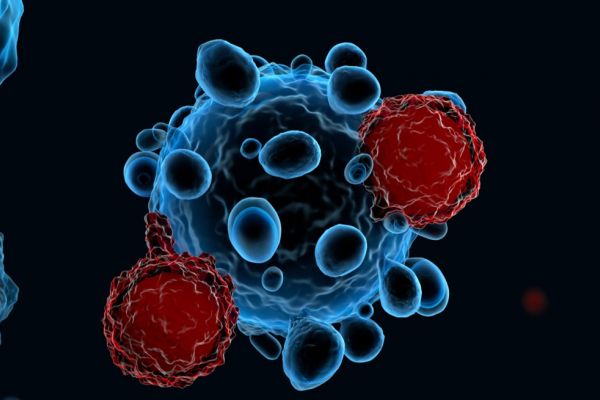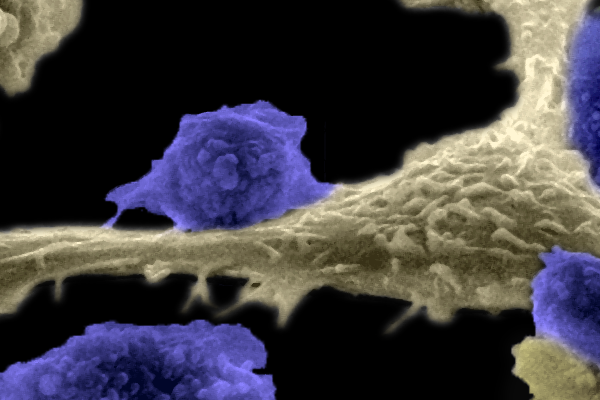These newer cancer drugs are important options against several cancer types
Immunotherapy drugs work by stimulating your body’s immune response. (Traditional chemotherapy drugs work by directly attacking cancer cells.) Several types of immunotherapies are used to treat cancer, including adoptive cell therapies such as chimeric antigen receptor T-cell (CAR-T) therapy, cytokines, immune system modulators, monoclonal antibodies, oncolytic viral therapies, cancer vaccines and immune checkpoint inhibitors (ICIs).
Generic name/Brand name
- atezolizumab/Tecentriq®
- avelumab/Bavencia®
- cemiplimab/Libtayo®
- durvalumab/Imfinzi®
- ipilimumab/Yervoy®
- nivolumab/Opdivo®
How immune checkpoint inhibitors fight cancer
Normally, your immune system and immune cells (such as T-cells) identify and destroy foreign substances and invaders such as bacteria, viruses, toxins and abnormal cells (including cancer cells). To keep your immune system from attacking and destroying your healthy cells, certain proteins on the surface of your immune cells bind with partner proteins on your healthy cells, making a checkpoint, or natural brake, that signals your immune cells to turn off.
Cancer cells can be tricky, however, and can make proteins that bind to the immune cells, form a checkpoint and turn off the T-cells, too. Cancer cells may also “hide” their surface proteins from the immune system so your T-cells don’t recognize them as invaders. If your immune cells were told to “turn off,” or your immune system doesn’t know the cancer cells are there, the cancer cells are free to grow, reproduce and spread uncontrollably.
Immune checkpoint inhibitor (ICI) drugs block certain checkpoint proteins on the cancer cells (CTLA-4, PD-1 or PD-L1 for example), releasing the natural brake and allowing the immune system to “see” the cancer cells and send T-cells to attack and kill them.
Why side effects occur
When the immune checkpoint inhibitor drugs block the checkpoints on the cancer cells, they also block the checkpoints that would normally keep the immune system T-cells from overreacting and attacking healthy cells. This may cause inflammatory side effects. Common side effects of ICI therapy include skin rashes, itching, dry mouth, mouth sores, cough, diarrhea, joint/muscle/bone pain, changes in liver function (seen in abnormal blood test results), symptoms of low thyroid hormones (sensitivity to cold, constipation, weight gain, dry skin, muscle aches), or immune-mediated reactions.
Side effects may occur during or after treatment and may occur anywhere in the body. Many side effects are treatable, but some rare side effects can cause death if not treated promptly, so it is very important to report all side effects to your health care provider. Side effects may be treated with corticosteroid drugs, which suppress the immune system. If side effects are severe, your doctor may delay treatment or try a different drug.
Contact your doctor right away if you have:
- Wheezing, coughing (If you can’t catch your breath or it is getting harder to breathe, call 911)
- Diarrhea
- Skin rash, itching
- Headache, dizziness or confusion
- Leg swelling
- Fatigue that is getting worse
- Weak facial or leg muscles
- Frequent urination
- Increased thirst
Never miss another Cancer Talk blog!
Sign up to receive our monthly Cancer Talk e-newsletter.
Sign up!What are immune-mediated reactions?
Sometimes ICI medications overstimulate the immune system, causing an immune-mediated reaction, and healthy organs and tissue are attacked. Mild inflammatory conditions occur in 30-50% of patients taking ICIs, but serious reactions occur in far fewer, about 5% of patients. Symptoms will depend on the specific organs or tissues that become inflamed. If you have multiple symptoms listed together under one organ, report the symptoms to your doctor immediately. They may indicate a serious problem that needs immediate treatment.
| Symptoms appearing together | Organ that may be affected or inflamed |
|---|---|
| Black or sticky stools or stools with blood or mucus; diarrhea; change in bowel habits; unexpected weight change; or stomach pain or tenderness | Intestines (colitis) |
| Fast heartbeat, weight loss or gain, increased sweating, hair loss, feeling cold, constipation, deeper voice than usual, muscle aches, dizziness or fainting, headaches that will not go away or unusual headache | Gland(s) that make hormones such as thyroid, pituitary, and adrenals |
| Jaundice (yellowing of the skin or whites of the eyes), nausea, vomiting, reduced appetite, pain on the right side of your stomach, dark urine, and bruising or bleeding easily | Liver (hepatitis) |
| Blurry vision, double vision, eye pain or redness, or other vision problems | Eyes |
| Severe muscle weakness, numbness or tingling in hands or feet, extreme sensitivity to light, fever, stiff neck, confusion, mood or behavior changes, persistent or severe headache, seizures | Nervous system, brain |
| New or changing shortness of breath, new or worsening cough, chest pain | Lungs (pneumonitis) |
| Rashes covering more than 25% of your body, or rashes that blister, peel or open | Skin |
| Changes in the color or amount of your urine, blood in your urine, swelling in arms and legs | Kidney |
| Irregular or rapid heartbeat, chest pain, shortness of breath at rest, fluid build-up/ swelling in legs, ankles, or feet | Heart (myocarditis) |
| Severe muscle or joint pain, severe muscle weakness, high blood sugar, high cholesterol | General, full body inflammation |
Learn more about ICIs
National Cancer Institute: Immune Checkpoint Inhibitors
National Comprehensive Cancer Network’s Immunotherapy Side Effects – Checkpoint Inhibitors



